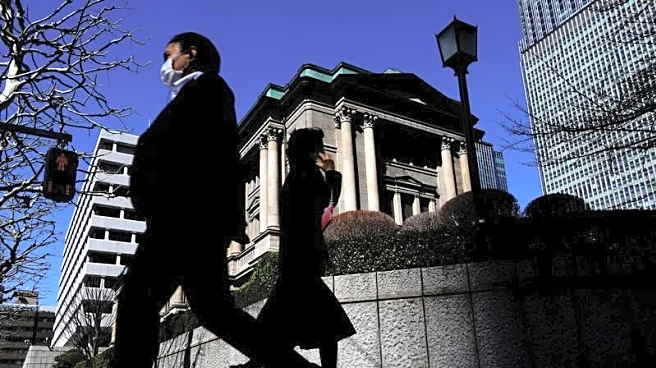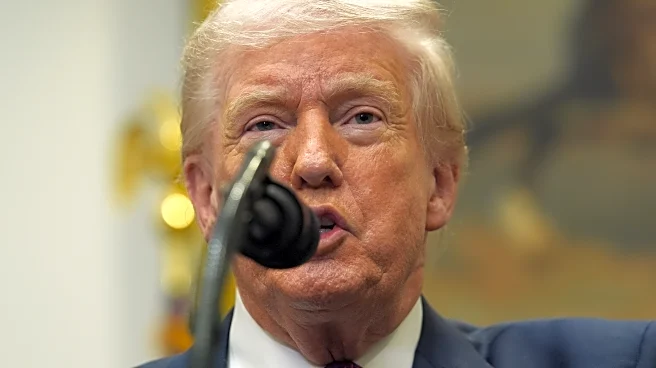(Reuters) -The Bank of Japan kept interest rates steady on Thursday but repeated its pledge to continue increasing borrowing costs if the economy moves in line with its projections.
As widely expected, the central bank maintained short-term interest rates at 0.5%.
Board members Naoki Tamura and Hajime Takata dissented to the decision, repeating their proposals made in September to raise rates to 0.75%.
COMMENTS
NORIHIRO YAMAGUCHI, SENIOR JAPAN ECONOMIST, OXFORD ECONOMICS, TOKYO:
"There was no surprise
in the BOJ's decision to keep the policy rate steady. The bank's median forecasts for growth and inflation were largely unchanged from the July outlook.
"The crucial question is whether Governor Ueda will indicate that the next rate hike is imminent during the upcoming press conference. For instance, if he assesses that the downside risks from tariff shocks have significantly receded, the market will likely price in an early rate hike. In that case, JGB yields are likely to rise and the yen will gain.
"I expect the BOJ to hike to 0.75% in December as incoming data confirm that the economy is performing in line with the Bank's forecasts. However, there's a material chance of a delay, depending on economic data and also if new Prime Minister Sanae Takaichi sticks to her cautious stance on monetary policy normalisation."
FRED NEUMANN, CHIEF ASIA ECONOMIST, HSBC, HONG KONG:
"The BOJ is tip-toeing towards a hike. With inflation remaining elevated, economic performance on a decent track, and fiscal tailwinds gathering speed, it remains a question of when, not if, the BOJ will hike. While markets have pushed back expectations for monetary tightening by Japan's central bank, officials may hike policy rates sooner rather than later.
"A jittery government bond markets, and a wobbly currency also suggest that financial markets are looking for an anchor, with a timely BOJ hike potentially helping in stabilizing price expectations. With October a missed opportunity to nudge rates higher, all eyes are now on December, when a rate hike appears likely."
HIROFUMI SUZUKI, CHIEF FX STRATEGIST, SMBC, TOKYO:
"As widely expected, the BOJ decided to leave the policy rate unchanged. Amid a slight rise in uncertainty since the beginning of October, driven by the inauguration of a new administration in Japan and a rekindling of U.S.–China trade frictions, the BOJ appears to have opted to keep rates on hold.
"Rather than reflecting political pressure, the decision seems to have been reached by the BOJ itself, based on its own assessment of economic conditions.
"With policy consistency confirmed vis‑à‑vis the Takaichi administration, the FX market is likely to see continued downward pressure on the yen.
"Assuming the BOJ continues to favour a gradual pace of rate increases, I expect an additional hike to be decided at the December policy meeting."
SHOKI OMORI, CHIEF DESK STRATEGIST, MIZUHO SECURITIES, TOKYO:
"The announcement reaffirms the authorities' commitment to a 'gradual normalization' of the policy stance and compels market participants to advance the timing they associate with the next policy adjustment.
"Although the underlying trajectory of monetary policy remains measured, the very confirmation of a steady path toward normalization obliges investors to contemplate, sooner than previously expected, the prospect of additional tightening.
"Between now and December, a number of key indicators will assume heightened significance. Foremost among these are the outcomes of the forthcoming Shunto wage negotiations, movements in service-sector prices, and developments in the external economy and trade policy.
"The foreign-exchange market is likely to witness an extended tug-of-war between renewed assessments of interest-rate differentials and continued caution over possible intervention. The authorities' message is clear: while an additional rate increase between December and the start of the next fiscal year has become a more concrete possibility, no immediate action is envisaged. The pace and frequency of policy normalization, therefore, will remain gradual, data-dependent, and responsive to both domestic and external developments."
CHRISTOPHER WONG, CURRENCY STRATEGIST, OCBC, SINGAPORE:
"Market disappointment on the lack of a hawkish tilt saw yen bulls bail. Investors are awaiting the press conference for further details from Governor Ueda, but direction of BOJ policy normalisation is for hikes nonetheless.
"The Fed-BOJ policy divergence should help underpin the direction of travel for dollar/yen to the downside, although the slow pace of BOJ policy normalisation can frustrate dollar/yen bears."
(Reporting by Reuters Asia markets team; Editing by Sherry Jacob-Phillips)

















